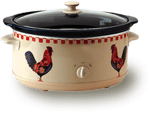 By Sherry Gray – Extension Instructor Nutrition Educator, EFNEP Supervisor Foods and Nutrition
By Sherry Gray – Extension Instructor Nutrition Educator, EFNEP Supervisor Foods and Nutrition
With colder weather and busy schedules, cooking with crock pot (or slow cooker) cooking is an attractive alternative during the fall and winter months. Crock pots can be big time savers when set in the morning to cook throughout the day. Many people who use crock pots regularly enjoy not having to fix dinner when they get home from work. And crock pot cookery is economical too: even cheaper, tougher cuts of meat are fork tender after simmering for 8-10 hours. But are crock pots energy efficient?
Crock Pot Vs. Electric Ovens…It’s A Toss-Up
Did you know that …. Crock pots run with lower energy wattage (70-250) than a conventional electric oven ( 2000-3000). However, while slow cookers’ heating elements stay on continuously, electric ovens cycle their elements on and off as needed to maintain temperature, often being on for only about one fourth of the actual cooking time. Assuming you would use a slow cooker on high for twice as many hours as your electric oven, the energy usage would probably come out about the same.
Total energy usage can be calculated by multiplying the wattage by your recipe’s cooking time. If you use a gas stove to cook with, it is harder to determine what the energy savings would be. Natural gas is a more efficient fuel than electricity and the newer electric-ignition gas ranges are about 30 percent more efficient than older models that have a continuously burning pilot light. Units used to measure energy consumption are different between gas and electric energy sources so they are more difficult to compare.
Some newer crock pot models are far more energy efficient than older ones. The size of the slow cooker can also affect efficiency. Smaller crock pots are more efficient. Energy consumption using the oven is affected by the number of other foods you can cook at the same time in your oven (so lower overall energy usage), how much heat you lose when you open the oven door, and how efficient and well insulated the oven is. The end result of this issue comes down to the variables – who has the better oven or crockpot. So what then are advantages of slow cookers vs. conventional electric ovens?
- Advantages of Crock Pots
- Flexibility of cooking time
- Can be prepared well in advance and left to cook all day
- Portable – you can take a crock pot anywhere and plug it in
- Usually no need for pre-cooking
- There are a great variety of recipes for one-pot meals
- You can use cheaper cuts of meat
- Advantages of conventional electric ovens
- There’s room to bake several items at the same time
- Food cooks much faster
- May use less energy because of quick cooking times, and the thermostat cycles the heating element on and off
- Better for baking items such as cakes, cookies, muffins
The real benefit of using a crock pot is the time saved by early preparation and cooking during the day. It sure is nice to come home at the end of a busy day to a hot, nutritious meal that is ready to serve! If you enjoy preparing meals in a slow cooker it can be economical and a real time saver. It may help your family eat a more nutritious meal if the alternatives are fast food or less healthy options. For small families, couples or singles, use the crock pot to make extra servings that can be refrigerated or frozen for later, saving even more time and energy. So with the cooler temperatures of fall and winter approaching, pull out the crock pot and enjoy delicious and nutritious hot meals!